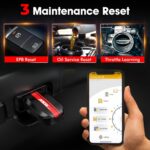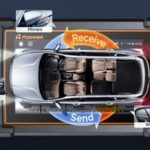Choosing the right ELM327 OBD2 Bluetooth adapter can be crucial for diagnosing and monitoring your car’s performance. This guide will help you understand the different types of adapters, compatibility issues, and recommend some reliable options available on the market. We’ll focus on finding the best ELM327 Bluetooth adapter for your needs.
Understanding ELM327 OBD2 Adapters and Connection Types
ELM327 adapters facilitate communication between diagnostic software, like Car Scanner, and your vehicle’s control unit. A quality adapter ensures a stable connection and accurate data retrieval.
Adapters are categorized based on their connection type:
- WiFi: Connects wirelessly to your device via a WiFi network.
- Bluetooth (Classic): Uses Bluetooth versions 1.x, 2.x, or 3.x for communication. Offers faster data transfer speeds compared to Bluetooth LE.
- Bluetooth LE (4.0 and above): Low Energy Bluetooth prioritizing power efficiency over speed. Provides a stable connection and is commonly used with iOS devices.
- Bluetooth MFi: Classic Bluetooth certified by Apple for use with iPhones and iPads. Requires a special agreement and licensing with Apple, making these adapters less common and more expensive.
- USB: Not supported by Car Scanner.
Choosing the Right Adapter for Your Operating System
iOS (iPhone/iPad): Car Scanner for iOS supports Bluetooth LE (4.0), Wi-Fi, and Bluetooth MFi adapters. Classic Bluetooth is NOT supported due to iOS limitations. Bluetooth LE adapters are recommended for their ease of use and stable connection. For the fastest speeds, consider a Bluetooth MFi adapter.
Android: Android supports Classic Bluetooth, Bluetooth LE, and Wi-Fi adapters. Classic Bluetooth is generally preferred for its faster data transfer rates and wider compatibility. However, some Android devices might experience connection issues when multiple Bluetooth devices are connected simultaneously.
Identifying a Quality ELM327 Adapter
Forget about focusing on ELM327 version numbers. The quality of an adapter isn’t solely determined by its advertised version. Look for an adapter that consistently performs its intended function without glitches or freezes.
Signs of a Bad Adapter:
- Unstable Connection: Frequent disconnections, freezing, or spontaneous reboots.
- Inconsistent Data: Missing parameters, inaccurate readings, or data loss.
- Limited Command Support: Inability to execute all necessary diagnostic commands.
- Compatibility Issues: Hard-coded for specific ECU addresses or limited protocol support.
- Potential for Damage: Risk of short-circuiting or spamming the car’s network with erroneous data.
Recommended ELM327 OBD2 Bluetooth Adapters
While we don’t sell adapters, we recommend the following based on user experience and feedback:
- OBDLink MX+ (Bluetooth MFi): High-end adapter with excellent performance, suitable for both iOS and Android.
- OBDLink CX (Bluetooth LE): High performance with a large memory buffer, ideal for iOS and Android.
- vLinker MC+, FS, MS: Reliable options with Bluetooth LE (MC+) or Bluetooth MFi (FS, MS) for iOS and various Bluetooth options for Android. Ensure firmware is updated.
- Vgate iCar Pro BLE 4.0: Compatible with iOS and Android due to dual Bluetooth chips (2.0 and 4.0). Update to the latest firmware for optimal performance.
Adapters to Avoid
Avoid adapters with “mini” in their name, cheap no-name brands, specific MAC addresses (starting with 11:22:33 or 00:00:00), KONNWEI, “Micro Mechanic,” “THINMI.COM,” and “KUULAA” branded devices. Also, avoid wired adapters as Car Scanner only supports wireless connections. xTool adapters are not ELM327 compatible.
Conclusion
Selecting the right ELM327 OBD2 Bluetooth adapter is essential for accurate car diagnostics. Prioritize reputable brands with proven performance and ensure compatibility with your device’s operating system. Consider factors like connection stability, data accuracy, and potential compatibility issues before making a purchase. A quality adapter will provide reliable performance and valuable insights into your vehicle’s health.



